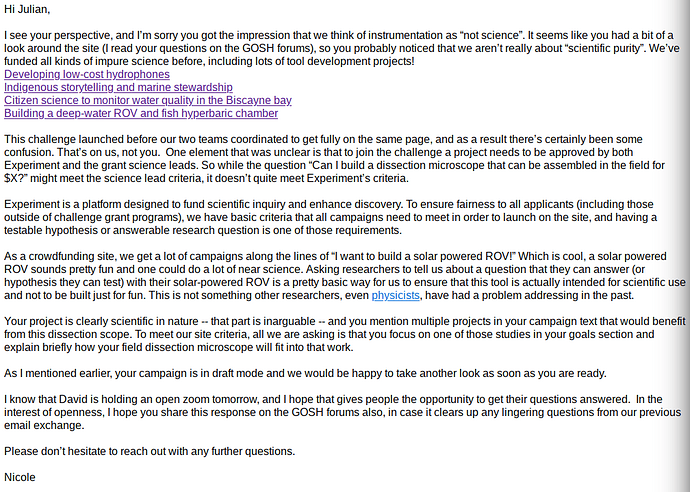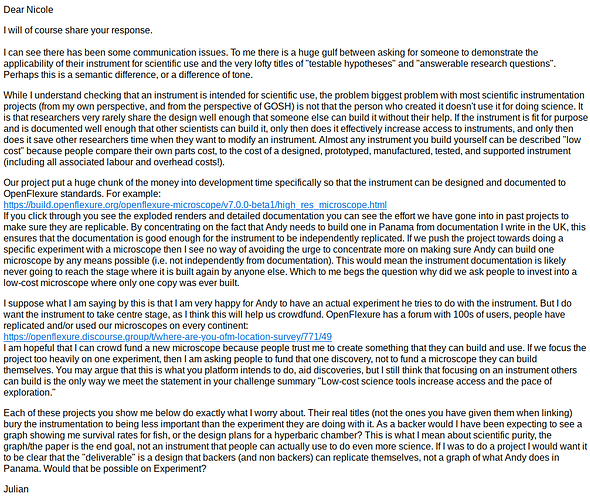Also eager to see @hikinghack’s hat on screen. ![]() And thank you @davidtlang for the responses from you and your team on this matter, I’ve sent you an email to sign up for the call next week. BTW I’m a huge fan of OpenROV, thanks for developing an amazing success story for open source and open science hardware!
And thank you @davidtlang for the responses from you and your team on this matter, I’ve sent you an email to sign up for the call next week. BTW I’m a huge fan of OpenROV, thanks for developing an amazing success story for open source and open science hardware!
Pedantic question first: ![]() You said 10:30 EST (UTC-5) in your message, but I thought the US east coast (presumably what you meant by the time) has been on EDT (UTC-4) since 12th March 2023??? If you can confirm, I’ll slot the meeting into my calendar accordingly.
You said 10:30 EST (UTC-5) in your message, but I thought the US east coast (presumably what you meant by the time) has been on EDT (UTC-4) since 12th March 2023??? If you can confirm, I’ll slot the meeting into my calendar accordingly.
Regarding the wider issue that @julianstirling has rightly pointed out, I was also considering submitting a proposal to work on the stereoscopic camera trap extensively discussed in this thread. However, upon seeing the applications that have been rejected, I am seriously discouraged from submitting something, as the camera trap stuff also don’t fit the hypothesis-based paradigm.
I share @julianstirling’s disagreement with the claim that framing - and possibly shoehorning! - projects as testable hypotheses will consistently result in “better” work. In my view, hypothesis-driven research is a very narrow subset of how science is done. One one hand, I happen to be working with researchers in medicine and clinical psychology at the moment, and can appreciate the importance of clearly defined hypothesis-based methodology in these fields (and tested with a double blind randomised controlled trail, etc.). On the other hand, I’ve worked across enough disciplines to know that this is not always the way to go. (Having a very multidisciplinary background can be a blessing and a curse, but in this case is a mind-expanding blessing!)
To add another example, I was part of a scientific team that studied the impacts from the 2010 Deepwater Horizon oil spill on marine wildlife in the Gulf of Mexico. Our work was highly exploratory with practically no hypotheses regarding what we’d find. “Despite” this, our results were published in journals such as PNAS, plus getting millions of USD for the research consortium. I have very deep misgivings and criticisms about how the scientific establishment deify and obsess over “high profile” journals and grant money. IMO that’s definitely not scientific! But I give these examples because even this ossified and byzantine establishment considered our work to be “good” enough.
The reason I used this example is that, in my humble opinion, the issue is deeper (and wider?) than whether development of hardware/instrumentation is “science” (and I believe it totally is in the way which @julianstirling, @naikymen, and @Harold described). It is about whether anything that doesn’t fit the rigid hypothesis testing mold counts as science (or “good” science). In my view, the answer is of course yes. There are various approaches for deductive and inductive enquiry that can fruitfully expand scientific understanding without an explicit hypothesis.
As @hikinghack pointed out, and also from my own experience, keeping things to a particular format is important from a practical perspective and totally understandable. More than that, I would even (possibly controversially) say it’s OK for Experiment to choose to only support science in the narrowly-defined hypothesis-testing form as described by @davidtlang, even if I disagree.
However, if that’s what Experiment chooses to do, then I suggest it should not in any way state or imply that the platform speaks for, represent, or support the huge diversity of ways in which great science could be done. Also, as @davidtlang et al. recognised (which I appreciate! ![]() ), the way the current low-cost science tool funding call is not well-designed and not a good fit for that narrow definition. Sadly, a huge opportunity cost has already been incurred in the form of the valuable time and effort that some of us have put into their submissions.
), the way the current low-cost science tool funding call is not well-designed and not a good fit for that narrow definition. Sadly, a huge opportunity cost has already been incurred in the form of the valuable time and effort that some of us have put into their submissions.
I think @hikinghack’s proposal is a good first step towards a compromise for the immediate problem at hand, and that a longer term deep reflection on exactly what Experiment is about and wishes to support would be useful.
The above represents my current views on the matter, which I’m happy to explain in the upcoming call if needed and/or desired. But I’d like to write them down here for the record. Thank you for your attention. ![]()
![]()
P.S. IMHO this thread is a good demonstration of the importance of having philosophy of science/theory of knowledge be part of scientific professional development/education. Some might not care (or not want to care) about such abstract concepts, but the problems demonstrated in this funding call show us the negative consequences of not thinking through (or not thinking enough about) high level/first order principles about science and what it is. I.e. great science such as the development of instrumentation not receiving the recognition and support it deserves!

